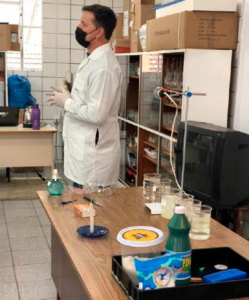News . Best Practices Organic functions of alcohol in times of pandemic (Best Practice Brazil)

This open scenario practice was carried out during the pandemic by Professor Rudinei da Rosa Salles, in the discipline of chemistry, on the theme “Organic functions of alcohol in times of pandemic” at the School of Basic Education Professor Adelina Régis. Students interacted with social scientists, educational researchers, and the local community, including family members. It was supported by APC PUC-PR.
CARE: The students were involved in the discussion about the COVID-19 contingency plan. The participants were 180 students, between 14 and 17 years old, from the 1st, 2nd, and 3rd grades of high school, with 162 of them having completed the scientific actions, with their families, a teacher, a researcher, and a scientist shared their concerns about the issues of cleaning and contamination, where the power of alcohol can make a difference. Questions about why alcohol, why 70% alcohol, why in the hands, how and why the contagion of COVID-19 occurs, how to prevent it, among others, were questions raised and discussed. The main purpose was to train multipliers students to disseminate the scientific knowledge studied at school to families and the surrounding community.
KNOW: Different activities were developed, in an interdisciplinary and transdisciplinary way, in Natural Sciences, and with an emphasis on the scientific content of Chemistry, particularly the analysis of data about alcohol in the prevention of COVID-19. In this way, the students became interested in the study, understanding the organic functions of 70% alcohol and its interactions in hygiene and contamination prevention measures. The students participated in carrying out the learning activities, expanding their repertoire of knowledge, based on science. The skills developed address the student’s ability to be a protagonist, acting as multipliers of scientific knowledge in COVID-19 prevention measures, especially speaking with property of how the destruction of the coronavirus happens with the use of alcohol. As attitudes, it was sought to develop the prevention of health and human life; to value the knowledge acquired in the school environment in the practice of the context in which one lives and to argue, with scientific property, in the discussions and practices of the use of alcohol in the prevention of COVID-19.
DO: Students were involved in the following activities:
- Analyze hygiene issues in the school, family, and society context as fundamental measures to prevent COVID-19.
- Contextualize the scientific content with the current situation of COVID-19, in school environments and the safety measures to be taken to preserve everyone’s health and life.
- Provide experiences on hand hygiene with soap and alcohol to prevent the spread of the coronavirus in the light of laboratory experimentation.
- Develop in school spaces the skills of being a protagonist in making responsible decisions in the face of COVID-19.
- Prepare students to be multipliers of correct information about COVID-19 hygiene measures, covering family, school, leisure, social and cultural environments.
FINDINGS: The open scenario methodology used was project-based collaborative learning. Students brought their own questions, discussed with the scientists and their families. The laboratory experiences made it possible to verify scientific knowledge in practice. The integration of the school curriculum with scientific action enabled new teaching and learning practices. It is observed that both complement each other in the teaching and learning processes.
OUTCOMES: In general, the students actively participated in the proposed activities on the study of alcohol in times of COVID-19. Always interacting with significant questions to expand knowledge through the scientific content of chemistry that guide the benefits and risk of using soap and alcohol in hygiene in the pandemic. It was surprising how the students began to act during and after the study was carried out. The dominance of scientific argumentation among peers was evident. The ability to make responsible decisions in the use of alcohol in hand hygiene in different spaces and places was really developed. It was gratifying to see the change in students’ habits in terms of caring, knowing and doing. However, the very social distancing in the pandemic caused a lot of disruption in the school routine and the return of face-to-face classes with 50% of students reduced the time for carrying out learning activities. Thus, the action did not have direct contact with the scientist as expected.
Find out more here: Our report.